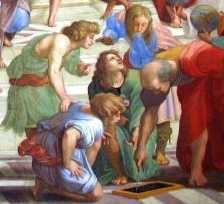Consors paterni luminis,
O Sharer in the Father's light
lux ipse lucis et dies,
Thyself Light of lights and the Day
noctem canendo rumpimus:
we interrupt the night with singing
assiste postulantibus.
attend to our praying.
O Light of light, O Dayspring bright,
coequal in Thy Father's light:
assist us, as with prayer and psalm
Thy servants break the nightly calm.
Aufer tenebras mentium,
Take away the darkness of our minds
fuga catervas daemonum,
drive away the swarm of evil spirits
expelle somnolentiam
expel our drowsiness
ne pigritantes obruat.
lest it bring ruin to us who hesitate continually.
All darkness from our minds dispel,
and turn to flight the hosts of Hell:
bid sleepfulness our eyelids fly,
lest overwhelmed in sloth we lie.
Sic, Christe, nobis omnibus
Thus, O Christ, to us all
indulgeas credentibus,
be lenient to your faithful
ut prosit exorantibus
that (it) may profit us who are pleading
quod praecinentes psallimus.
what we chant before Thee in song.
Jesu, Thy pardon, kind and free,
bestow on us who trust in Thee:
and us Thy praises we declare,
O with acceptance hear our prayer.
Sit, Christe, rex piissime,
tibi Patrique gloria
cum Spiritu Paraclito
in sempiterna saecula. Amen.
O Father, that we ask be done,
through Jesus Christ, Thine only Son,
Who, with the Holy Ghost and Thee,
doth live and reign eternally.
Attributed to St. Ambrose 340-397. Translation by Joseph William Chadwick (1841-1882) and John David Chambers (1805-1893). Historically the concluding doxology "Praesta, Pater piissime" was used with this hymn and hence the above metrical translation's mis-match with the Latin.
Britt was a ton of help today. This hymn was in fact the Matins hymn for Tuesdays, so if you go to that link, just find hymn number 13 or look in the index for "Tuesday at Matins."
Pigritantes comes from pigror, pigrari, pigratus sum (hesitate, hang back), but it has been intensified by the addition of "-it" after the root. The "-it" apparently can also signify iteration, hence I have opted for "the continually hesitating." Britt just says "slothful." I guess that is a good definition of sloth: you just keep hesitating until inaction forces you into laziness, even if you started out determined not to be lazy. I guess the "hang back" meaning could also result in a translation something like "the continual non-starters."
I have experienced this often when trying to pray while sleepy. The prayer just pauses, and then pauses again, and then again for longer, and pretty soon I am not praying anymore. Which is fine if I'm trying to pray myself to sleep like I did last night, but terrible when I am trying to get up early to pray.
YOUR URGENT PRAYER REQUESTS
-
PLEASE use the sharing buttons! Thanks! In your charity would you please
take a moment look at the requests and to pray for the people about whom
you read?...
4 hours ago

No comments:
Post a Comment